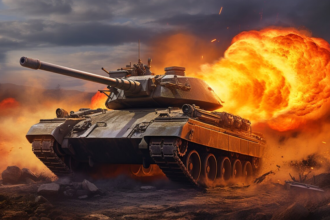Following their recent Super Bowl triumph, President Donald Trump has stated he will invite the Philadelphia Eagles White House Visit. Declaring in the Oval Office on Tuesday, Trump said, “absolutely, they’ll be issued an invitation. We hope to see them; they deserve to be down here.”
Earlier this month the Eagles defeated the Kansas City Chiefs 40-22 to claim their second Super Bowl championship. Their acceptance of the invitation follows their past bypassing of a visit in 2018. Although initial rumors suggested they could turn down, reports from US media show the team now plans to attend the tournament this year.
Why did stories of a White House snub go viral?
After a weeks-old story from The US Sun came back online, rumors implying the Eagles would turn down the offer set off a social media frenzy. The debate reflects past events where political divisions have caused championship-winning teams to decide from visiting the White House. The political division in the United States has progressively impacted many spheres of life, including sports, where teams and players regularly express opinions on significant events.
This circumstances has sparked important debates on sports channels and social media. While some observers contend that declining the offer is an athlete’s right, particularly if they disagree with a president’s views, others believe that teams should embrace the invitation as a sign of togetherness and respect of the office of the president. The argument still shapes how championship teams answer White House invites.
Which sports team customizes visiting the White House?
Eagles White House Visit has been a custom going back to the 19th century. Teams have periodically turned down the invitation, though, as a political statement in recent years. Only one of the four Super Bowl-winning teams, the New England Patriots in 2017, paid a visit to the White House during Trump’s first term. Following their 2018 triumph, the Eagles chose to decline the visit, which led Trump to criticize the team stating the players disagreed with his position “that they proudly stand for the national anthem.”
Trump summoned a gathering of Eagles supporters to what he said to be a “celebration of the American flag,” instead of the team. Many athletes and celebrities considered this as a politically driven action, which simply widened the gulf separating Trump from the sports scene.
Sports teams have traditionally considered White House trips as a celebration rather than a political statement. But given the current environment, the event has become more important and shapes team choices on whether to go. The argument around the Philadelphia Eagles White House Visit mirrors the more general conversation about the junction of politics and sports.
Have White House Invitations Declined for Other Sports Teams?
Under Trump’s presidency, other teams have also skipped a Philadelphia Eagles White House Visit. Following star player Stephen Curry’s public declaration that he did not want to visit, NBA invites the Golden State Warriors were not invited in 2017. Additionally not invited were the Warriors, who once more won the NBA Championship in 2018.
During Trump’s presidency, there were notable sports trips even if some teams declined. One of the most unforgettable events happened in 2018 when he greeted the football team of Clemson University with a fast-food feast including McDonald’s, Wendy’s, and other takeout cuisine. The unusual celebration made news and spurred debate on the suitability of the dinner selection for a White House gathering.
Declining White House visits are not unique under Trump’s leadership. Under different governments, many sportsmen and teams have decided to miss the tournament claiming political or personal reasons. Future championship teams probably will have to make similar judgments if political tensions in the nation keep widening apart.
Are White House Visits Political?
Grand Valley State University’s history instructor Louis Moore clarified that these trips can have political relevance. “Going to the White House is a lifetime dream for some guys,” he remarked. “But it’s absolutely political in basketball, football, and women’s soccer. The concept not to travel is political; even the concept to go is political.”
He also mentioned how since Trump’s election in 2016, these trips have become more politically charged. ” Teams weren’t visiting the White House early on in Trump’s presidency. Announcements were absent prior to then, Moore clarified. But today you find others declaring they are not going.”
A Philadelphia Eagles White House Visit now serves more than only commemorating a Super Bowl victory in the present environment. Rather, it has evolved into a statement—in favor of or against the government depending on your perspective. The split is clear not only among teams but also among the fan base; some people advocate the decisions to boycott while others feel teams should go regardless of politics.
Have Other Presidents Reversed Such Refusals?
Not only is Trump not the only president to deal with teams or athletes turning down invites to the Eagles White House Visit. Following Ron Reagan’s administration, NBA great Larry Bird turned down a visit to the White House after guiding the Boston Celtics to an NBA Championship. “If the president wants to see me, he knows where to find me,” Bird commented somewhat memorably.
Matt Birk of the Baltimore Ravens declined to participate in a White House party honoring President Barack Obama in 2013 because of his anti-abortion views. Birk attacked Obama’s remarks in which he declared, “God bless Planned Parenthood.” Though it has lately gained greater attention, these events reveal that the custom of athletes declining invitations to the White House is not a fresh occurrence.
Why Do Chiefs Want to Host Championship Teams?
Athletes have traditionally been sought for support and presence at the White House by presidents. “Presidents want to be surrounded by winners; winners want to be surrounded by the president,” Moore added. Every presidential candidate has sought sponsors from sportsmen since the 1930s, therefore confirming the link between politics and sports.
These trips give presidents chances to match success with friendship. Hosting sports teams allows the government to display a link to popular culture and the passion for sports across the country. But in a time when sportsmen are more politically conscious, these trips now have a more great meaning.
With the Eagles scheduled to attend the Philadelphia Eagles White House Visit celebration, this visit may change the political dynamics surrounding sports and presidential customs. The ruling will probably be closely observed since it shows how modern sports teams negotiate political conflicts.








